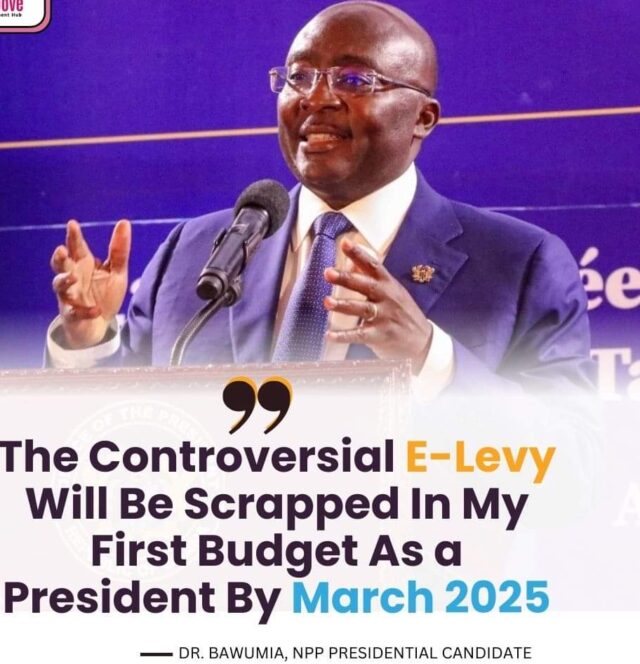Bawumia’s First Year: The Controversial E-Levy Scrapped
In a surprising turn of events, Ghana’s Vice President, Dr. Mahamadu Bawumia, has announced the scrapping of the highly controversial E-Levy in his first year in office. The decision has sparked a flurry of reactions, both in Ghana and internationally, as the E-Levy was a significant and contentious component of the country’s fiscal policy.
Background of the E-Levy
The E-Levy was introduced in Ghana’s 2022 budget as a measure to increase government revenue and address the country’s fiscal challenges. The policy aimed to levy a tax on electronic transactions, including mobile money transfers, bank transactions, and other digital financial services. The government projected that this levy would generate significant revenue to support infrastructure projects and social programs.
However, the E-Levy was met with immediate backlash from various sectors of Ghanaian society. Critics argued that the levy disproportionately affected the poor and the informal sector, which relied heavily on electronic transactions. The backlash was compounded by widespread concerns about the transparency and efficiency of the government’s revenue management.
The Controversy and Opposition
The controversy surrounding the E-Levy was not merely limited to public sentiment. Opposition parties and civil society organizations voiced strong objections, labelling the policy as regressive and detrimental to economic growth. Protests erupted across the country, with many accusing the government of imposing a tax that exacerbated existing economic difficulties rather than alleviating them.
In response to the growing dissent, the government attempted to defend the E-Levy by emphasizing its potential benefits, such as increased funding for development projects and improved public services. Despite these efforts, the policy faced significant legislative and legal challenges, which further intensified the debate.
*Dr. Bawumia’s Decision to Scrap the E-Levy*
Dr. Bawumia’s decision to scrap the E-Levy within his first year as Vice President is a notable political move that reflects a shift in the government’s approach to fiscal policy. The decision is seen as an attempt to address public dissatisfaction and restore confidence in the administration’s commitment to addressing the economic challenges facing the country.
In his announcement, Dr. Bawumia acknowledged the widespread concerns and criticisms surrounding the E-Levy. He stated that the decision to abolish the tax was made after careful consideration of its impact on the economy and the well-being of Ghanaians. The Vice President emphasized that the government remains committed to finding alternative solutions to meet its revenue needs without placing undue burden on the public.
*Reactions and Implications*
The reaction to the scrapping of the E-Levy has been mixed. Supporters of the decision view it as a positive step towards addressing the economic grievances of the populace and demonstrating responsiveness to public concerns. They argue that this move could enhance the government’s credibility and foster greater trust among the electorate.
Conversely, critics caution that the removal of the E-Levy could lead to potential shortfalls in government revenue, which may impact funding for critical infrastructure and social programs. They argue that while the E-Levy was controversial, its abolition without a clear alternative revenue source might create new fiscal challenges.
Looking Ahead
As Ghana navigates its economic landscape, the focus will likely shift to finding sustainable and equitable solutions for revenue generation. Dr. Bawumia’s decision to scrap the E-Levy marks a significant moment in his vice presidency and highlights the complexities of fiscal policy-making in a dynamic political and economic environment.
The broader implications of this decision will become clearer in the coming months as the government outlines its revised fiscal strategies and continues to address the nation’s economic priorities. For now, the scrapping of the E-Levy stands as a testament to the shifting dynamics of Ghanaian politics and the ongoing dialogue between government and the public on issues of economic governance.









